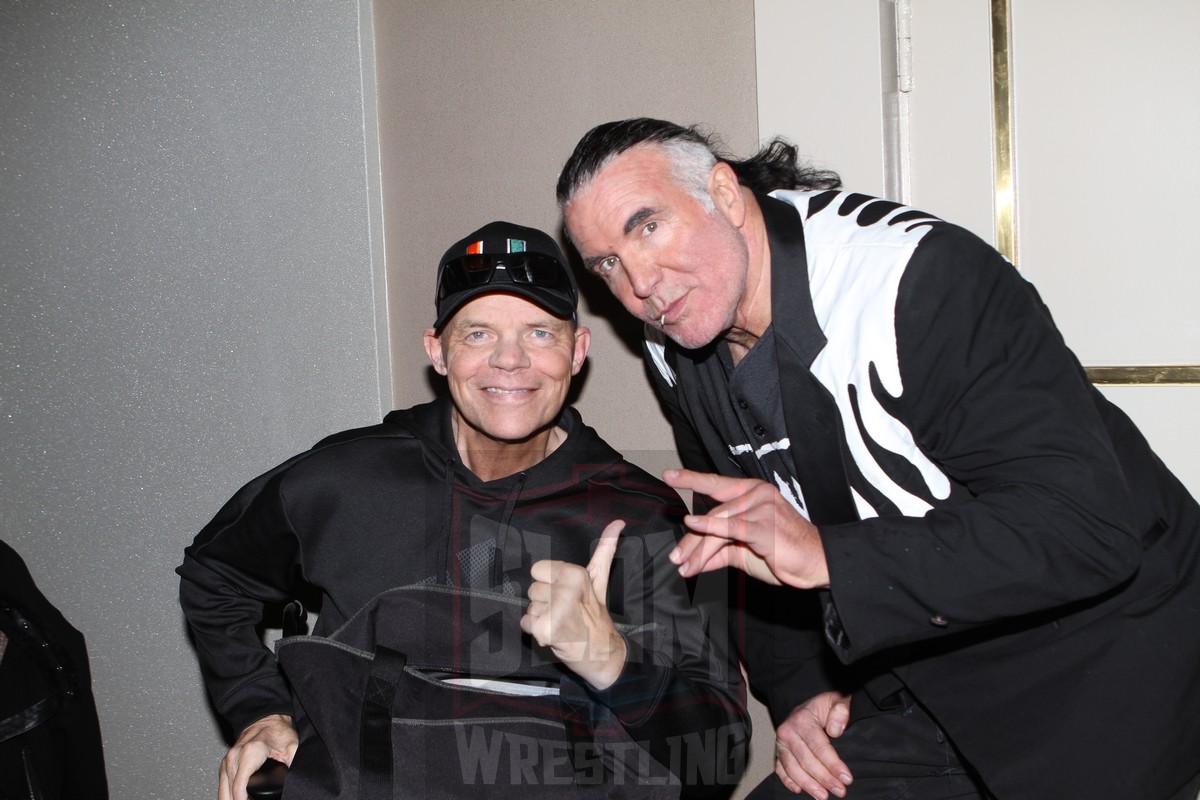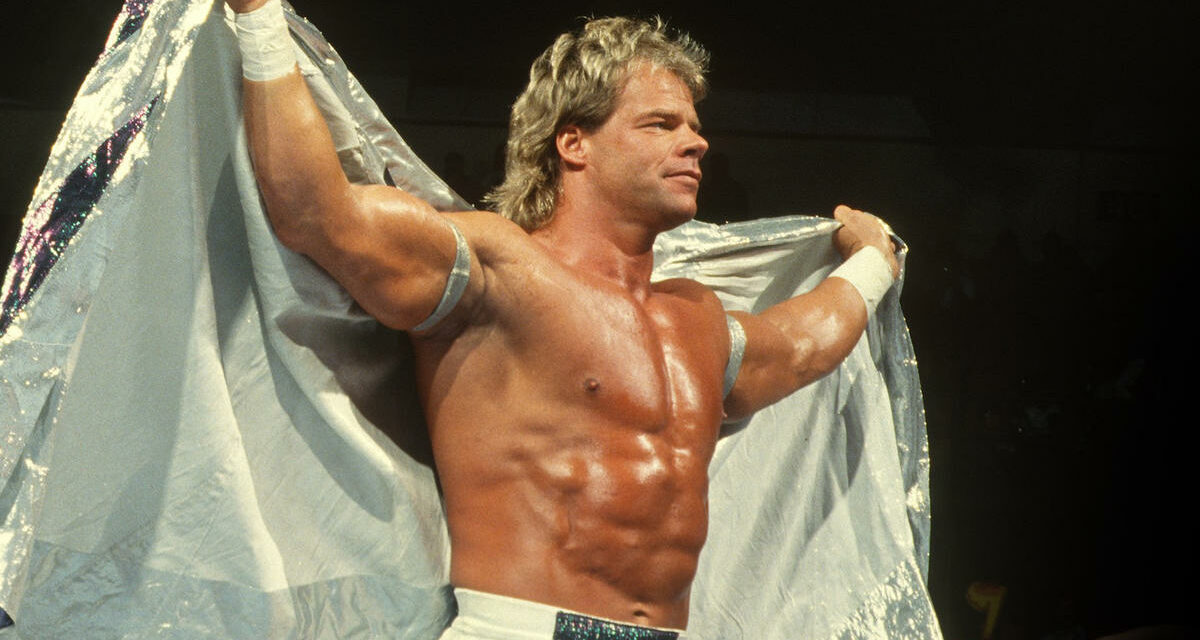Lex Luger has a remarkable enthusiasm for life. That’s what his long-time friend Sting says about the former narcissist. And it isn’t often when Bret Hart calls someone one of his heroes.
The A&E documentary about the life and career of Lex Luger featured “put the camera on me” as a familiar refrain for Larry Pfohl, who professional wrestling fans know as Lex Luger (and will be referred to as such from here on out). But the man himself is quick to say, “I was always thinking of me, myself and I.” But today he exclaims “I am a miracle of God.”
The Sunday, August 7 episode of Biography was a very well-detailed exploration of Luger’s life, from a Buffalo, New York, upbringing to secret football player, to accomplished wrestler with a near-tragic modern day. Although produced by the WWE, this installment of the series features enough input from wrestlers who aren’t defined by the corporate office.
Luger’s father, a virtuoso pianist, didn’t want his son to play high school football. “I forged his name,” laughs Luger, shown in a wheelchair. It wasn’t established where Luger lives today, but he has spent his time between Buffalo and Atlanta in recent years. Luger details that he wanted to be a running back, but coaches at suburban Orchard Park wanted his tall and lean frame on the offensive line. Luger agreed to play on the line if he fumbled, which he did the first day of practice.
Coach Dan Reinhoudt called Luger a “relatively quiet” athlete with high expectations. After high school he first went to Penn State University and met his wife, collegiate athlete Peggy Hall (neither she, nor Lex’s children, son Brian or daughter Lauren, took part in the special).
Famed Penn State Coach Joe Paterno cut the young offensive lineman because he got into trouble. Luger then went to the University of Miami, where Florida State University and WWE Hall of Famer Ron Simmons took notice. Simmons would say that Luger helped encourage him to look into professional wrestling after his football playing days were over.
Luger’s attitude would continually get him into trouble during his college football days, to the tune of him not finishing his education. “I went to the beach,” Luger said. Too young for the National Football League, Luger went to Montreal of the Canadian Football League. He played there until he was old enough to try for the NFL. Impressed with his 6’4” and 270-pound frame, he was inked to the Green Bay Packers. “My ego got in the way,” he said. Plus, he was injured prone and that forced the legendary Bart Starr to waive the lineman.
Luger “bought a house” in Tampa Bay when he signed with the USFL’s Bandits. Then when he went to Memphis, fans of Jerry Lawler asked if he was a wrestler. With a career playing football waned, Luger looked into Championship Wrestling from Florida. He “loved” the brutal training with Hiro Matsuda. By his own admission, Lex fast-tracked to the ring within a couple of months, but they didn’t have a moniker for him. A team brain-stormed from the TV show “Magnum, P.I.” and thought “Luger”. A fan of Superman, the wrestler added “Lex”. Gordon Solie and Percy Pringle then introduced Florida’s next supervillain.
“I think it turned out pretty good,” Luger chuckles.
A video from the later Paul Bearer (Pringle) says that Lex was “horrible” in the ring. Luger says his very first live wrestling event was when he was in the ring on television.
That’s also when Simmons saw his old gridiron nemesis on the screen. “He encouraged me.”
Jim Cornette explains that Luger “wasn’t a fan” and “didn’t know” the sport. Meanwhile, Luger’s physique was compared to Arnold Schwarzenneger and he quickly won a championship strap. Around that same time in 1986, Luger’s son, Brian was born, “and we took off like a rocket ship,” he says.
Luger quickly garnered the attention of “traveling World Champion” Ric Flair. The NWA Champion went to Tampa to face the new sensation in a 60-minute match. Luger said he was nervous, Flair said Lex had “one of the top five physiques” he had ever seen in wrestling. Observing referee Bill Alfonso said Flair made Luger “look like a million bucks”. And the draw was a “long night”.
Jim Crockett, Jr. is on to explain that the still relatively-new Four Horseman looked at a way to revamp. J.J. Dillon was on to say the Horsemen were looking for the “cream of the crop” and that “Ole didn’t fit in.” Luger replaced Ole and the second incarnation of the faction was born. “He was in the right place at the right time,” said Dillon. Luger said he went to Flair’s robe maker to celebrate, and he bought a Mercedes.
Cornette iss back to say that the early success, which included the U.S. Championship, earned Luger Crockett Promotion’s first guaranteed contract. “That didn’t go over well with everyone else,” he said.
Barry Windham would call Luger “stiff” and others would complain that he was getting paid more while they would have to protect the youngster in the ring. Eric Bischoff called Luger arrogant while Flair said he was “perceived” as such.
The million-dollar contract was hammered out between Luger and Jim Crockett, Jr. He called Luger’s ego good for business. “It drew money and people wanted to see him,” he said.
In a rare paintless or sunglass-less appearance, longtime friend Sting joins the conversation, saying that Luger had a “better body than anyone else”. The two enjoyed working out, wrestling and their families got along. Sting even moved into Luger’s neighborhood.
Luger left the Horsemen and was positioned to take the NWA Championship from the Nature Boy. It was 1991 and Flair quit when Crockett sold to Ted Turner and the brand changed to WCW. Famously, Flair took the “big gold belt” to the WWE. Cornette said Luger got appreciably better in the ring and last-minute booking put Luger against Windham for the “vacant” WCW belt. Luger won. “We were scrambling to make things work,” he said.
Sting said the WCW was considered “second class citizens” to the WWE. But Luger was lured with Vince McMahon’s World Bodybuilding Federation. A loophole in his contract didn’t say Luger couldn’t work for the WBF and he has earmarked time away from the road.
Bruce Pritchard appeared to say that Luger was the main “get” for McMahon and the Saturday morning WBF program.
But Luger crashed his motorcycle in June of 1992. He says a nurse told him that he was DOA but now he just faced the prospect of an amputation of his arm. Sting said Luger’s arm and elbow “were open; we didn’t know how they would save him”.
Incredibly, talented doctors saved his arm, infamously inserted a steel plate into his forearm and Luger returned to wrestling and the WWE in six months.

Lex Luger and Scott Hall at a fan fest. Photo by George Tahinos, https://georgetahinos.smugmug.com
Pritchard said Luger had “potential to be a huge star.” Manager Bobby Heenan fumbled the pronunciation of “The Narcissist” but Lex Luger was now in the WWE. Luger called the arrogant athlete “a neat bad guy” and he was excited.
Bret Hart said Luger “looked like a good dance partner” and Kevin Nash said the Narcissist lived up to his name. “He was The Total Package”.
Around this time, Hulkamania was cooling off and Cornette said McMahon was looking for a new superhero babyface to take on the “unbeatable” Yokozuna. Enter the Fourth of July bodyslam challenge on the deck of the U.S.S. Intrepid. The Red, White and Blue savior Lex Lugar arrived and dramatically body slammed the 550 pound WWE Champion.
Inspired by President George H.W. Bush’s countrywide train ride, the “Lex Express” featured the All-American challenger in a custom-made bus the hero tried to ditch after the first week.
Gerald Brisco said the PR machine was to be on tour all summer. Lex, who didn’t get to see his young family for only a day or two during this time, “didn’t share the same vision”. Pritchard asked if Luger was the right guy for the campaign.
Luger complained that he “lost 10-pounds” of muscle during the 4-5 week journey, he was often hungry and irritable. At one point video shows Luger admonishing a fan who had apparently said WCW was superior to WWE.
Bret called Luger a “quality guy, but not personable”.
Cornette said Luger wasn’t a common man to look up to or a superhero. Pritchard called him a phony.
But Luger knew he wasn’t going to be the next Hulk Hogan. “I didn’t shy away,” he said. “Who wouldn’t want to be that guy?”
On August 30, 1993 in a controversial fashion, Luger defeated Yokozuna by countout at SummerSlam. Balloons rained down from the ceiling in Auburn Hills, Michigan, but no one, including Sean Waltman, Nash or Cornette could understand the finish. “If he had won the championship, he would have been over”, said Cornette. McMahon had wanted to stretch the feud out to Wrestlemania. The next spring, Luger didn’t win the championship in a rematch and all credibility was lost.
By happenstance, Luger ran into Sting and inquired about going back to WCW. Eric Bischoff said he wasn’t interested but floated a “lowball offer” to Luger, expecting him to be insulted. Instead, Luger was so burned out in WWE that he grabbed the opportunity and surprisingly appeared on the first episode of Monday Nitro at the Mall of America. Luger said he felt badly about leaving WWE and Prichard said McMahon “was betrayed.”
Again, Luger was in a good place at an ideal time. Lead to the ring by Jimmy Hart, Luger was a popular fan-favorite from the get-go. The entire locker room experienced a more relaxed, humbled and professional charmer. “He went out of his way to be a good guy in the locker room”, added Bischoff. As a result, Luger’s contract was negotiated. Big Show and Goldberg both gave Luger emphatic thumbs up.
Then Luger made Hollywood Hulk Hogan submit in the Torture Rack for the WCW Championship. It might be a surprise to note that Luger earned a World Championship in the same building where the WWE skunked him against Yokozuna.
“That was a big deal”, recounted Diamond Dallas Page. Luger called it a “magical time”.
But it also started a dark time in which the wrestlers would leave Nitro appearances, go back to their hotels and watch the replays, have drinks and pop pills.
Luger also began dating Miss Elizabeth.
Sting noted that Luger could drink, take drugs and “was able to function” with only a few hours of sleep. Luger himself said he had “too much time and too much money”.
In 2001, WCW was bought out by the WWE and Luger had a guaranteed contract which meant he could stay home for three years and get paid. Luger’s marriage ended and he started to have legal problems.
On May 1, 2003 Miss Elizabeth (as identified in the Atlanta television news clip) passed away while with Luger. It’s interesting to note that an accompanying newspaper clipping written by current AEW backstage interviewer Alex Marvez flashed on the screen.
DDP explains that Elizabeth’s death “destroyed him for a long time”. In 2005, a still out-of-it Luger was stumbling through independent bookings. He later went to jail for drug possession and contemplated suicide before finally accepting a friendly invitation from Pastor Steve Baskin to work out together. Luger put the Pastor through his paces “but I couldn’t get rid of Pastor Steve”.
The two spent time together, but Baskin took a long time before asking Luger to attend church. Luger went to a Sunday Night Service and he was “scared to death”. In 2006, when Luger had no “true purpose or meaning” he came clean and asked God for forgiveness. Baskin and others noted a “physical change” in Luger.
“I understand peace and serenity”, he said. “I am forever changed”.
Sting, who had previously become a Brother in Christ, saw a remarkable change in his friend. A photo in which Sting baptized Luger was shown. Luger said he had to “forgive myself”.
That wasn’t it for The Total Package. He took a five-hour flight from Atlanta to San Francisco and felt a crimp in his neck. During a hotel stay, Luger experienced a medical emergency from massive swelling in his neck and back. He was paralyzed.
Baskin noted that Luger “couldn’t move” and “laid in bed for a year”. Sting said he had to feed his friend with a fork during physical therapy.
Lex said it was a “challenge to overcome” and he lives independently. Doctors have told him that “1% of patients survive this type of injury”. He still goes to the gym although “the big muscles are gone”. He is shown giving advice to Jonathan, a ripped and muscle-bound warrior who during this last season, nearly won TV’s Survivor.
Flair says that Lex is “beaming” now more than ever before. Recently, Luger said he would somehow walk to the podium if he were to be inducted into the WWE Hall of Fame. Based upon his life’s story, he would find a way to do it.
RELATED LINKS
- Aug. 17, 2013: Highs, lows, and redemption all in Lex Luger’s story
- Sep. 26, 2013: Luger’s memories of 1993 make for compelling DVD
- Slam Wrestling’s A&E/Biography archive



